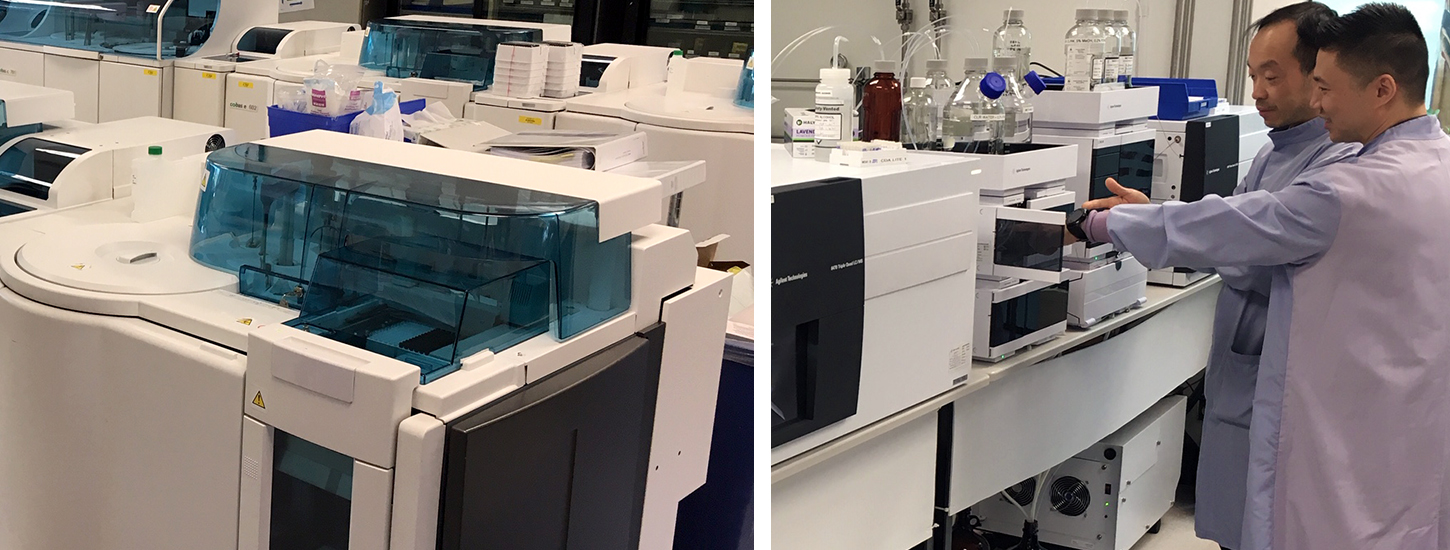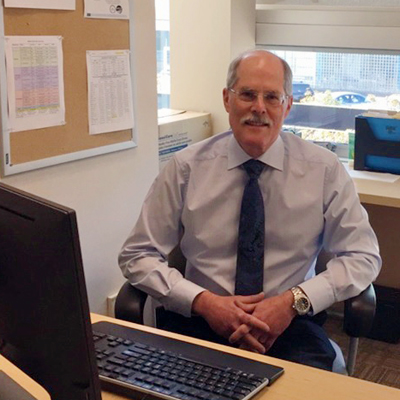recent career transition

Chemistry Analyzers and Toxicology Lab
Author

William E. Schreiber MD Clinical Director of Chemistry, BC Professor | Dept of Pathology & Lab Medicine, UBC LifeLabs | 3680 Gilmore Way | Burnaby, BC V5G 4V8
Dr. Wes Schreiber moved from Vancouver General Hospital (VGH) to LifeLabs in 2017. Below he reflects on his new job.
Why did you decide to leave the VGH Pathology department and move to a large private reference laboratory?
I worked at VGH for over three decades. After all that time, I needed a change of venue and responsibilities, to try something new. The senior medical director at LifeLabs contacted me about becoming their Director of Clinical Chemistry for BC, and I said yes.
What are the major differences between the two labs?
LifeLabs is an outpatient lab only. Blood and other specimens are collected at Patient Service Centres (ie, bleeding stations) across the entire province and transported to laboratories in Burnaby, Surrey or Victoria for analysis. Turnaround times for most routine tests are < 12 hours. By comparison, the VGH laboratory does 80% of its work for inpatients, many of whom are quite ill, so there is always pressure to get results out as quickly as possible.
At LifeLabs, the main chemistry analyzers are fed by automated track systems. Samples are transported to the appropriate analyzer and, after the test is completed, they are routed to a refrigerated storage bin. There is an in-house engineering crew that keeps the line running.
Most unusual/esoteric tests are not performed by LifeLabs. Low-volume tests are sent to local hospital laboratories or, in some cases, to reference laboratories in other parts of Canada or the US.
Capital equipment purchases happen much more quickly. In the past year, three aging tandem mass spectrometers were replaced by four new ones (at a cost of about $2 million). There is a more aggressive replacement cycle for all instruments.
Have your views on public vs. private health care changed?
In my opinion, the current split of performing outpatient testing mainly in the private sector and inpatient testing in the public sector is a reasonable way to divide these functions.
The private system has more freedom in determining how to provide services. It can create efficiencies that the public system cannot match at present. The bureaucracy in hospitals and health authorities is a huge impediment to running a cost-effective laboratory.
In my opinion, the current split of performing outpatient testing mainly in the private sector and inpatient testing in the public sector is a reasonable way to divide these functions.
Does this mean you have gone over to the dark side?
Let’s say that my opinion is better informed than it was before.
How would you compare the medical/scientific staff at LifeLabs to VGH?
My colleagues at LifeLabs are focused on providing accurate results and high-quality consultations to our customers. All of them have prior experience working in laboratories based at large public hospitals. They are also a collaborative group and have been very helpful in my transition to LifeLabs.
The amount of service work is higher than at VGH. There is less time for research projects, and this is reflected in fewer publications and presentations. However, everyone participates in teaching UBC students.
How has your work environment changed?
My office is in a large rectangular building that is two stories high and located in a business park. There are no UBC or Vancouver Coastal Health placards anywhere. I have a nice view of the parking lot and can see everyone coming in the front door.
All of the medical/scientific staff offices are on the second floor, whereas all of the technologists and analytical instruments are on the first floor. It takes more effort to find and speak with our techs.
Most of the people on the second floor work in human resources, government relations, quality and regulatory affairs, process engineering, physical plant, customer service and administration. It is not a medical environment.
Pathologists from the CJ Coady group are present every day to sign out some of the chemistry and hematology tests. Many of them trained with us at VGH, and it is nice to work with them as colleagues (they turned out OK!).
My cell phone is always on the desk or in my pocket, as calls can come in at any time. The main problems and consultations I deal with are about mundane topics - diabetes, hepatitis, iron studies, high potassium results, etc. I have been teaching these topics for years, but for my own peace of mind it has been necessary to pull out provincial and national guidelines to make sure that my advice to clients is accurate. A taste of humility…
What has been the biggest surprise?
I am doing more good for patients here than I ever did at VGH.
The need for laboratory medicine consultations in the community. VGH is full of specialist physicians who are well versed in their areas of practice. In contrast, general practitioners, nurses, naturopaths and other LifeLabs customers often ask for guidance about basic issues in lab testing. I am doing more good for patients here than I ever did at VGH.
And your biggest regret?
The department at VGH is first-class. I miss the camaraderie of my colleagues there, both the medical staff and the technologists. Despite all of the administrative hassles and other irritants of a large hospital, there is a sense of shared purpose. And the people are easy to get along with.
Are your colleagues at VGH still speaking to you?
I come out to the VGH campus about once every 2-3 weeks to attend rounds, give lectures and visit with colleagues. Most people are happy to see me - maybe I should have left years ago…
Has the new job affected your relationship with the UBC department?
Oddly enough, it has actually strengthened my relationship to the department. LifeLabs is not an academic environment, and I miss the interaction with departmental faculty. Last year I joined the SPROT (peer review of teaching) committee, and I have started work on a book.

